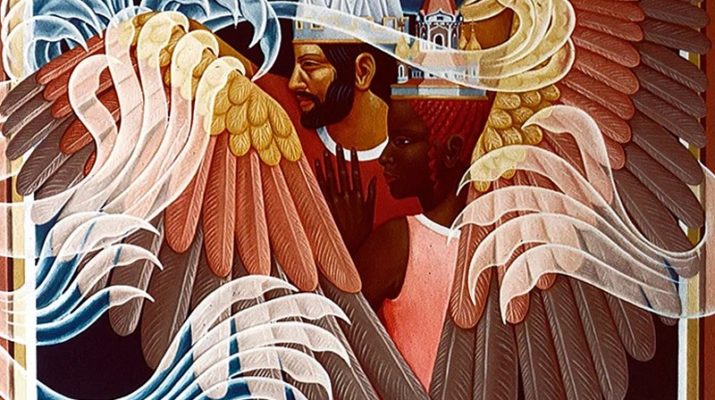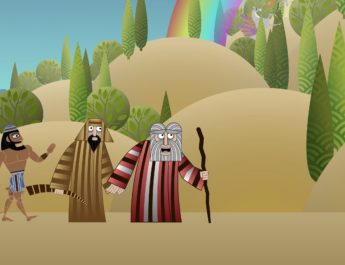Psalm 17:6-9, 13, 15
A Women’s Lectionary 9
6 I callA upon you, for you will answerB me, O God;C
inclineD your earE to me, hearF my words.G
A “call” = qara. This is to call or call out – to call someone by name. Also used more broadly for calling forth.
B “answer” = anah. This is answer, respond, announce, sing, shout, or testify. It means to pay attention, which implies responding and, by extension, starting to talk. Used in a specific sense for singing, shouting, testifying, etc.
C “God” = El.
D “incline” = natah. This is to stretch or spread out, to extend, or bend. In can also imply moral deflection.
E “ear” = ozen. This is ear, hearing, audience, show. Properly, it is broadness – applied to its ear in reference to its shape.
F “hear” = shama. This is to hear, call, consent, or consider. It implies listening intelligently, giving attention, and, because of these two factors, obedience and action are often implied.
G “words” = imrah. From emer (speech, thing, utterance, promise, argument, command); from amar (to speak, say, answer, command, promise, report). This is any kind of utterance, a word or commandment.
7 Wondrously showH your steadfast love,I
O saviorJ of those who seek refugeK
from their adversariesL at your right hand.M
H “wondrously show” = palah. 7x in OT. This is to distinguish in a literal or figurative sense. It can also be to sever, set apart, or show self to be marvelous.
I “steadfast love” = chesed. From chasad (being good, kind, merciful; may mean bowing one’s neck as is done in the presence of an equal for courtesy’s sake; so, if one in a superior position is treating you like an equal, that is what is captured here). This is favor, goodness, kindness, loving kindness, pity, reproach, or a good deed. When done by God to humanity, this is mercy/loving kindness. When done by humanity to God, it is piety.
J “savior” = yasha. To deliver, defend, help, preserve, rescue, be safe. Properly, to be open, wide or free, which implies being safe. Used causatively, it means to free.
K “seek refuge” = chasah. This is to take refuge or flee for protection. Figuratively, it means to hope or trust in someone or something.
L “adversaries” = qum. To arise, stand, accomplish, establish, abide. This is rising as in rising against, getting up after being sick or asleep, arising from one state to another, becoming powerful, or rising for action. It can also be standing in a figurative sense.
M “right hand” = yamin. May be from yamam (to go or choose the right, use the right hand; to be physically fit or firm). This can mean right hand, right side, or south. Since most people are right-handed, the metaphorical usage of this word presumes that the right hand is stronger and more agile. Thus, it is the instrument of power and action.
8 GuardN me as the appleO ofP the eye;Q
hideR me in the shadowS of your wings,T
N “guard” = shamar. This is to keep, watch, or preserve. It means to guard something or to protect it as a thorny hedge protects something.
O “apple” = ishon. 5x in OT. From ish (man); perhaps from enosh (human, humankind, mortal); from anash (to be weak, sick, or frail). This is middle. It could be the pupil as the middle of the eye or the middle of the night or a ball.
P {untranslated} = bat. From ben (son literal or figurative; also, grandson, subject, nation); from banah (to build or obtain children). This is daughter in a literal or figurative sense.
Q “eye” = ayin. This is eye in a literal or figurative sense so eye, appearance, favor, or a fountain (the eye of the landscape).
R “hide” = sathar. This is hide, conceal, or be absent. It is hiding because something is covered – used in a literal or figurative sense.
S “shadow” = tsel. From tsalal (to be or become dark, shade; this is the shade as during twilight or shadow as associated with something opaque). This is shade in a literal or figurative sense. So, it could be shadow, shade, protection, shelter, or defense.
T “wings” = kanaph. This is wing, edge, corner, extremity. It can also be a flap or fold of a garment or the pinnacle of a building.
9 fromU the wickedV who despoilW me,
my deadlyX enemiesY who surroundZ me.
U “from” = paneh. From panah (to turn, face, appear). This is face in a literal or figurative sense. It could be face, presence, anger, respect. It can also be used of God to indicate divine favor or presence.
V “wicked” = resha. From rasha (to be wicked, guilty, make trouble, do wrong; can also be condemn, guilty, inflict punishment; this verb implies disturbing or violating). This is wrong, particularly moral wrong. It can be wickedness, evil, wicked deeds, or something that is ill-gotten.
W “despoil” = shadad. This is to ruin, assault, devastate, oppress, destroy completely. Properly, it is being burly. Figuratively it is something that is powerful.
X “deadly” = nephesh. Related to naphash (to refresh or be refreshed). This is soul, self, person, emotion. It is a breathing creature. Can also refer to appetites and desires.
Y “enemies” = oyeb. From ayab (to hate or be hostile to). This is a foe or enemy as one that you are hostile to.
Z “surround” = naqaph. 19x in OT. This is to strike, cut down, surround, destroy, corrode, knock together, or enclose. It can be to surround as a guard or like the sea. It can meaning coming to the end of a festival time or enclosing in a net or trap.
13 Rise up,AA O Lord,BB confrontCC them,DD overthrowEE them!
By your swordFF deliverGG my lifeHH from the wicked,
AA “rise up” = qum. Same as “adversaries” in v7. See note L above.
BB “Lord” = YHVH. From havah (to be, become) or hayah (to come to pass, become, be). This is the name of the God of Israel, the self-existent and eternal one, the tetragrammaton. This pronunciation has been lost to time so “Lord” is generally used in its place.
CC “confront” = qadam. Perhaps from qedem (front, formerly, before, east, eternal, everlasting, antiquity). This is to come in front or be in front and so meet, anticipate, confront, receive, or rise. It sometimes means to meet for help.
DD “them” = paneh. Same as “from” in v9. See note U above.
EE “overthrow” = kara. This is to bow, crouch, kneel down, subdue. It is to bend the knee in many senses. It can also mean to smite, a woman crouching in childbirth, or bowing to worship God.
FF “sword” = chereb. From charab (to attack, slay). This is any sharp instrument like a sword, dagger, axe, or mattock.
GG “deliver” = palat. This is to escape, slip out, deliver, carry away, or calve.
HH “life” = nephesh. Same as “deadly” in v9. See note X above.
15 As for me, I shall beholdII your faceJJ in righteousness;KK
when I awakeLL I shall be satisfied,MM beholding your likeness.NN
II “behold” = chazah. This is to gaze at – to see or behold. It can also refer to perceiving as a mental process or looking at something with pleasure. It can be used particularly to mean seeing a vision.
JJ “face” = paneh. Same as “from” in v9. See note U above.
KK “righteousness” = tsedeq. This is rightness, righteousness, vindication. It is everything that is just or ethical. That which is right in a natural, moral, or legal sense. It also includes just weights (i.e. true weights). Figuratively, this is justice, righteousness, equity – even prosperity.
LL “awake” = quts. Related to qayits (fruit, harvest, dry season); from quts (summer, clip off). This is arise or watch. It is to awake in a literal or figurative sense.
MM “be satisfied” = saba. To be satisfied or full in a literal or figurative sense. Also, to have plenty of.
NN “likeness” = temunah. 10x in OT. From the same as min (kind, sort, species). This is something that has been apportioned or fashioned. It can be an embodiment or shape. It can also figuratively be a favor that manifests.
Image credit: “Shadow of your Wings” by Peter Koenig, 1980.




